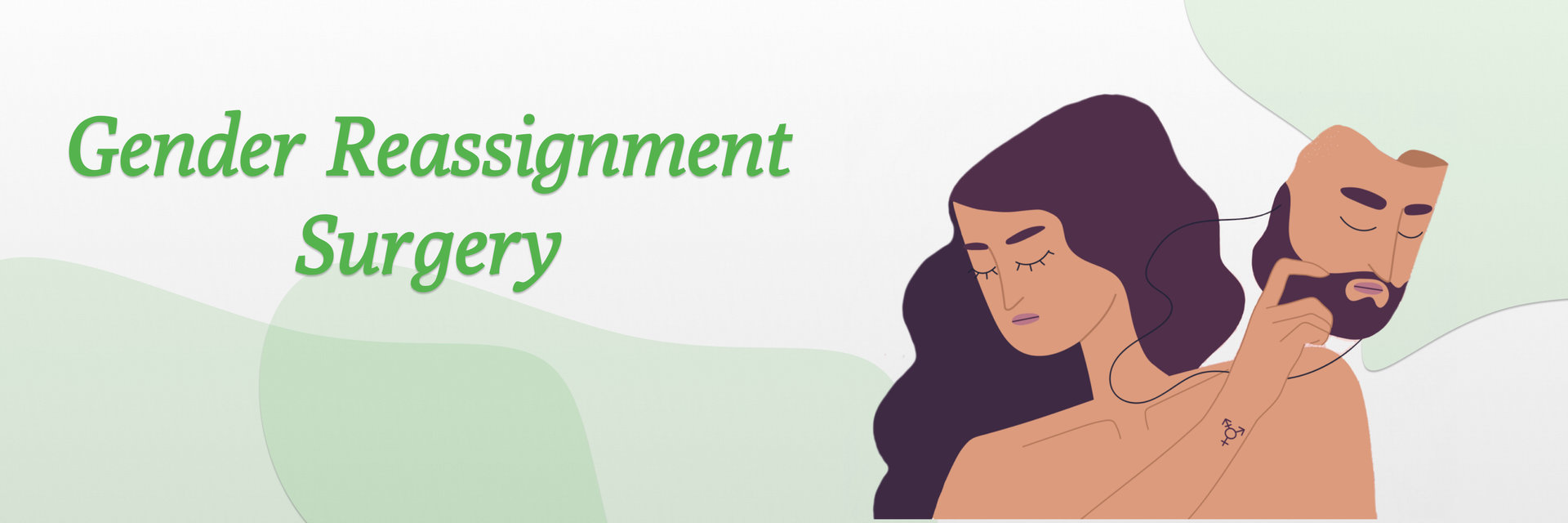What is orchiectomy?
Orchiectomy refers to the removal of testicles of transwomen to get a more feminine look. MtF Orchiectomy can provide significant relief for transgender individuals who experience gender dysphoria. It can make them feel more comfortable in their bodies and live more. Orchiectomy transgender surgery is to help them feel more comfortable in their bodies. This procedure removes the testicles, which stops the body from producing testosterone. For transgender people, this can be helpful because it reduces feelings of discomfort or distress that they may experience due to their gender identity. It is important to know that orchiectomy is a permanent procedure.
You may be wondering why some transgender individuals choose to undergo an orchiectomy. Well you can get all this here…
In a study of transgender patients, 35% had undergone gender-affirming surgery at some point in their lives. Of those who had surgery, 25% had procedures on their chest and 13% had procedures in their genital area.
Does orchiectomy work?
Yes, an orchiectomy is a proven surgical procedure that is commonly used for both medical and gender affirmation purposes.
Take charge of your health and your life. Contact us today!
How does Orchiectomy Work, know the procedure?
If you're considering an orchiectomy as part of your transition journey, it's important to know the further process, here it is-
Anaesthesia- | · The person is given general anaesthesia, so they are asleep and pain-free during the surgery.
|
Incision- | · The surgeon makes a small incision in the scrotum or lower abdomen.
|
Testicle removal- | · The surgeon makes a small incision in the scrotum or lower abdomen.
|
Closure- | The surgeon makes a small incision in the scrotum or lower abdomen.
|
Recovery- | · The person stays in the hospital for observation, then goes home the same day or the day after the surgery.
|
After the surgery, the person may experience some pain and swelling, but this can be managed with medication and ice packs. It is important to follow the surgeon's post-operative instructions and take hormone therapy as needed.
Benefits and Risks of orchiectomy transgender
You might be curious about the potential orchiectomy transgender benefits as well as the risks and complications associated with it to help you decide whether you should go for the procedure or not, right?
To know more about it, here you go!!
| Benefits | Risks |
|
|
|
|
|
|
|
|
It's important to discuss the potential risks and benefits of an orchiectomy with a qualified healthcare provider to make an informed decision.
Eligibility Criteria
Are you considering going for an orchiectomy but unsure whether you are eligible for it or not?
Let’s check out!
- Age: The individual must be of legal age and able to provide informed consent for the surgery.
- Gender identity: The individual must have a well-documented gender identity. That is different from the sex assigned at birth.
- Hormone therapy: The individual must have undergone a period of hormone therapy. Usually for at least one year. It is to ensure that they have made informed decisions about the surgery. To assess their response to hormone therapy.
- Mental health evaluation: The individual must have undergone a mental health evaluation. To ensure they are capable of making an informed decision and to assess their readiness for the surgery.
- Medical evaluation: The individual must have undergone a medical evaluation. It is to assess their health and identify any potential risks associated with the surgery.
It's important to note that the eligibility criteria for orchiectomy may vary depending on the healthcare provider, the individual's medical history and needs, and the regulations in their country or state.
Types of Orchiectomy transgender
Did you know there are different types of orchiectomy?
Simple Orchiectomy: Simple orchiectomy for transgender patients is the most common type of orchiectomy. The surgeon makes a small cut in the scrotum or lower abdomen and removes both testicles. The cords that attach the testicles are tied or sealed to prevent bleeding.
Bilateral Orchiectomy: Bilateral orchiectomy transgender is like a simple orchiectomy, but only one testicle is removed at a time. The procedure is performed twice, once on each side.
Subcapsular Orchiectomy: This is a less common procedure. In this the outer layer of the testicles is removed. While the inner tissue is preserved.
Inguinal Orchiectomy: In this procedure, a cut is made in the lower abdomen and the testicles are removed through the groin area. This approach may be preferred in some cases to avoid scarring in the scrotal area.
The type of orchiectomy procedure chosen will depend on various factors. It includes the individual's medical history, health, and the healthcare provider's expertise and preferences.
Take the first step to recovery. Get in touch with us for your treatment.
Okay , so you have chosen the type of orchiectomy you want to go for but wondering how to proceed further and prepare for it?
Don’t worry! Here are the details!
How to prepare for Orchiectomy Transgender?
The key points to prepare for an orchiectomy as a transgender individual:
· Find a qualified healthcare provider experienced in performing the procedure.
· Have a consultation with your healthcare provider. To discuss the surgery and your medical history.
· Stop certain medications and smoking several weeks before the surgery.
· Follow instructions such as fasting before the surgery.
· Arrange for someone to help you with basic tasks after the surgery.
· Take time to mentally and emotionally prepare yourself.
· Follow your healthcare provider's specific instructions.
Procedure Details

Pain- Are you worried about the pain? Don’t worry! During an orchiectomy procedure for transgender individuals, one will be under general anaesthesia, so should not feel any pain during the surgery. After the procedure, you may have some pain, swelling, and bruising in the surgical area. But your healthcare provider will give you medication to manage any discomfort.
Duration- The procedure hardly takes between 30 minutes to an hour. After the surgery, you may stay in the hospital for a few hours to watch your recovery. Depending on your situation, you may be discharged on the same day or the day after the procedure.
Hospital stay- The amount of time it takes to recover can vary from person to person. Sometimes it depends on the type of orchiectomy performed. It is important to follow your healthcare provider's instructions for post-operative care. Attend any follow-up appointments to ensure proper healing and recovery.
Done with the procedure and wondering what next?
Let’s find out!
What to expect after an orchiectomy transgender?
Recovery-
- You may have some pain, swelling, and bruising after the procedure. But medication can help manage any discomfort.
- You should avoid strenuous physical activity for a few weeks. Also keep the surgical area clean to prevent infection.
Side-Effects-
- You may feel tired, nauseous, or constipated after the procedure. But these are usually temporary.
- Emotional or psychological changes may also occur after the procedure.
Post-operative Guidelines-
- Attend all follow-up appointments with your healthcare provider. If required, inform them of any signs of infection or complications.
- Follow more guidelines provided by your healthcare provider. To promote healing and reduce the risk of complications.
- If you have any questions or concerns, talk to your healthcare provider.
Now, let’s discuss the section that matters the most!
Yes, you guessed it right!
Results!
Mtf orchiectomy results
Improvements seen:
- After an orchiectomy for mtf, you will experience a decrease in the production of testosterone, which can result in changes to your physical appearance and body function.
- You may notice a reduction in body hair, a decrease in muscle mass, and changes to your skin and fat distribution.
- You may also experience improvements in your mental health and emotional well-being.
When results are visible:
- The timeline for when you will see results can vary. But you may begin to notice some changes within a few weeks to a few months after the procedure.
How long do they last:
- The results of an orchiectomy can be long-lasting. But it's important to note that they may not be permanent. Other factors, such as hormone replacement therapy or ageing, can affect the results over time.
Overall, an orchiectomy can be an effective way to achieve desired changes for transgender individuals. It is important to have realistic expectations and to discuss the potential risks and benefits with your healthcare provider.
Success Rate of Orchiectomy Transgender
An orchiectomy is a surgical procedure to remove the testicles. It is a common part of gender-affirming surgery for transgender women.
The success rate of orchiectomy for transgender women is very high, with few complications. According to a study published in the Journal of Sexual Medicine.
The complication rate for orchiectomy in transgender women was 1.7%, with no serious complications reported.
Yes, you read that right!
In simpler words, an orchiectomy for transgender women is a safe and effective procedure with a low risk of complications. It can help ease gender dysphoria and is an important step in the gender confirmation process.
It's important to remember that an orchiectomy is just one part of a larger transition process for many transgender individuals. There are others also.
Are you curious to learn about them?
Here you go!
Other procedures used along with orchiectomy transgender
An orchiectomy is one of the surgical procedures used in gender affirmation surgery for transgender women. It is often combined with other procedures to achieve a more complete feminization of the body.
Some of the other procedures used along with orchiectomy for transgender women include:
| Other procedures | Details |
| This is a surgical procedure to create a vagina, often using penile and scrotal tissue.
|
This involves placing breast implants to enhance breast size and shape.
| |
Facial feminization surgery | This includes a variety of surgical procedures. Jaw feminization, forehead feminization etc. To appear more feminine.
|
| This includes procedures to contour the body and create a more feminine look. | |
This includes procedures to change the vocal cords and larynx. To achieve a higher pitched, more feminine voice.
|
The specific combination of procedures used in gender affirmation surgery can vary depending on individual needs and the availability of medical resources.
It is important for transgender individuals to discuss their options with qualified medical professionals. To determine the best course of action for their individual needs.
Now, let’s talk about that one thing that those interested in undergoing orchiectomy transgender want to know!
Yes, it is the cost of the procedure!
Cost of Orchiectomy Transgender
The cost of orchiectomy for transgender individuals in India can vary depending on several factors.
Such as the geographic location of the procedure, the surgeon's fees, and any extra costs such as anaesthesia and facility fees.
In India, the mtf orchiectomy cost can range from INR 50,000 to INR 1,50,000. Depending on these factors. But, it's important to note that the actual cost can vary and may be lower or higher than these estimates.
Does insurance cover Orchiectomy?
It is also worth noting that insurance coverage for orchiectomy. It's important for transgender individuals to check with their insurance provider to determine their coverage and to explore all available options for financing the procedure if necessary. Also, some clinics and organisations may offer financial help for transgender individuals who cannot afford the full cost of the procedure.
Want to inquire about personalised treatment expenses? Don't hesitate. Talk to us today.
Confused between an orchiectomy and scrotectomy?
Let’s clear your confusion!
Orchiectomy vs. scrotectomy
| Orchiectomy |
Scrotectomy
|
|
|
|
|
|
|
|
|
Have some more questions related to orchiectomy transgender?
Then do not miss reading the below FAQs.
You might get an answer to your question!
FAQs
Q: Does orchiectomy change gender?
A: Orchiectomy alone does not change a person's gender. It is a surgical procedure that can be part of a gender-affirming treatment plan for transgender individuals to help alleviate gender dysphoria and align their physical characteristics with their gender identity.
Q: Does orchiectomy help with feminization?
A: Yes, orchiectomy can help with feminization for transgender women. The removal of the testicles stops the production of testosterone.
Q: Can you have kids after orchiectomy?
A: No, orchiectomy results in the loss of sperm production and infertility, which means individuals who undergo this surgery cannot have biological children.
Q: Is orchiectomy reversible?
A: No, orchiectomy is generally considered a permanent form of gender-affirming surgery. It is not reversible in terms of restoring testosterone production or undoing physical changes that have already occurred.
Reference
https://www.healthline.com/health/orchiectomy-for-transgender-women







